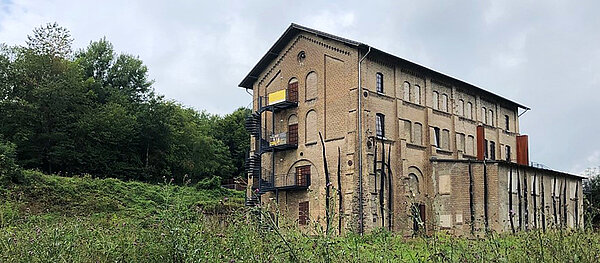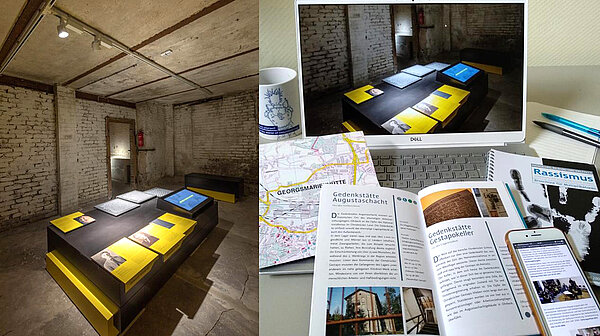GEDENKSTÄTTEN GESTAPOKELLER UND AUGUSTASCHACHT
26.02 - 12.03.2021
anmeldepflichtig
08.02.2021


In the Osnabrück region in Lower Saxony/Germany, there are two places of remembrance which are closely connected and form a unique ensemble with special and diverse learning opportunities due to their historical connection under National Socialism: The Gestapokeller Memorial in cells of the former Secret State Police (Gestapo) in the city of Osnabrück, and the Augustaschacht Memorial in buildings of the former Ohrbeck Labour Education Camp (AEL) in Hasbergen/Osnabrück district. Furthermore, there were a number of forced labour camps in the Osnabrück region. With hardly any remains from those camps, it is the witnesses’ statements and memories of the former forced labourers that are of great importance for researching the history of those sites.
The Project:
For many years, SCI and the Memorials have been conducting regular Work- and Studycamps at the historical sites with young international volunteers. Volunteers have the opportunity to make visible the stories of the often forgotten millions of forced labourers and the hundreds of thousands of AEL prisoners. In earlier Work- and Studycamps, this has been achieved through archaeological-documentary activities. Since 2020, the cooperation has been redesigned into an additional digital format to meet the new requirements under the pandemic.
In our 2nd Digital Work- and Studycamp, volunteers have the opportunity to interact with other international volunteers online, to exchange different historical perspectives and discuss references to the present. They will contribute to historical-biographical work and take part in virtual tours at historical sites, including the Memorials. Using a selected biography, the volunteers will deal with female perspectives on forced labour and Nazi history as well as their causes and consequences.
Historical Background:
Until the end of WWII, over 30.000 forced labourers worked in the Osnabrück region and had to live in more than 500 forced labour camps. More than one third was from Ukraine, Belarus and Russia. They were monitored by the Gestapo. In case forced labourers attempted to flee, or their work performance was considered 'insufficient', forced labourers were sent to labour education camps – male workers to AEL Ohrbeck and female workers to AEL Ahaus. There they were forced to work under even worse conditions and systematically poor care. Many lost their lives in Gestapo custody. Their punishment served as a deterrent for other forced labourers. Further research is to be done on the fate of female forced labourers in the Osnabrück region.
Volunteers’ tasks:
The volunteers work together online to prepare the story of a female forced labourer in the Osnabrück region. They each write text fragments of a biographical interview with a former female forced labourer, help with translations where possible, put the fragments together, put them in relation with historical context which they researched, and thus jointly trace the biography of this person in order to preserve it for the future. The joint project of the volunteers will be included in the memorial's exhibition and thus serve further documentary and educational purposes.
Structure of the project:
The volunteers meet in virtual spaces on a regular daily basis for 2–3 hours, each weekday and on and Sat 27. February. A Digital Work-and Studycamp puts emphasis on community and a strong cohesiveness of the group in addition to joint volunteer work and historical learning. Through such international encounters, SCI has made an important contribution to understanding and peace work during the last 100 years. For this reason, there will be an extensive group-finding phase at the beginning of the project (Fri 26.02. – Sat. 27.02.) to get to know each other, clarify expectations, wishes and suggestions, gather individual knowledge and create a sense of community. During the course of the project, the group will take part in online workshops on the topic, exchange information about the work and discuss and reflect on perspectives on the prisoner's biography and the volunteers' own references to it. There will be optional consultations with members of the team for specific questions, provision of technical support, etc. Volunteers are very welcome to share their own expertise with the rest of the group.
In addition to the meetings within the group, the volunteers work individually or in small teams on transcription, translation or research tasks according to their individual abilities. Furthermore, the volunteers have the opportunity to take part and to contribute to an optional accompanying program.
Requirements:
Equipment with tablet/computer and/or smartphone, and stable internet connection; willingness to work several hours a day on the PC for two weeks and to participate in digital meetings every weekday and on one Saturday; good written & spoken English skills; knowledge of Ukrainian or Russian for transcription work is an advantage. Knowledge of the usual office software is also necessary; experience with transcription software is highly appreciated.
Please bring sensitivity for the memorial theme and interest in historical different historical perspectives and cultures of remembrance as well as an understanding of today's challenges. Please make sure that you’ll be able to participate for the whole duration of the project.
Organisational Questions:
Please register via https://workcamps.sci.ngo/icamps/camp-details/camp-14588.html
For further information please contact the SCI at incoming@sci-d.de or call +49 228 21 20 87. The placement fee for the two-week project is 30,– EUR for volunteers from Germany. This should be transferred to the SCI in advance. International volunteers please check the exact amount with your sending office.
All questions concerning the program will be answered by Nadine Tauchner nadine.tauchner@augustaschacht.de (requests from Germany) and Margarete Zimmermann margarete.zimmermann@augustaschacht.de (requests from Russia, Ukraine) of Augustaschacht Memorial, Tel. +49 (0) 5405 8959270.
Volunteers will be accompanied by a highly qualified team of SCI and Gestapokeller and
Augustaschacht Memorial volunteers, historians/historical educators and a project consultant, who will guide you through the whole process. The SCI group leader will get in touch with you in advance.
Detailed information on the history and present of the Augustaschacht and Gestapokeller Memorials can be found on this pages and on SCI Germany here: www.sci-d.de/english.
Many greetings,
the Organising Team
At this moment we are unable to offer you all of the content in your language. All untranslated content is marked accordingly. To hide the markings, simply move the mouse pointer over the respective content.
We hope you find all the information you are looking for.
If you have any questions, feel free to contact us.
The team at the Osnabrück Memorials greets you.